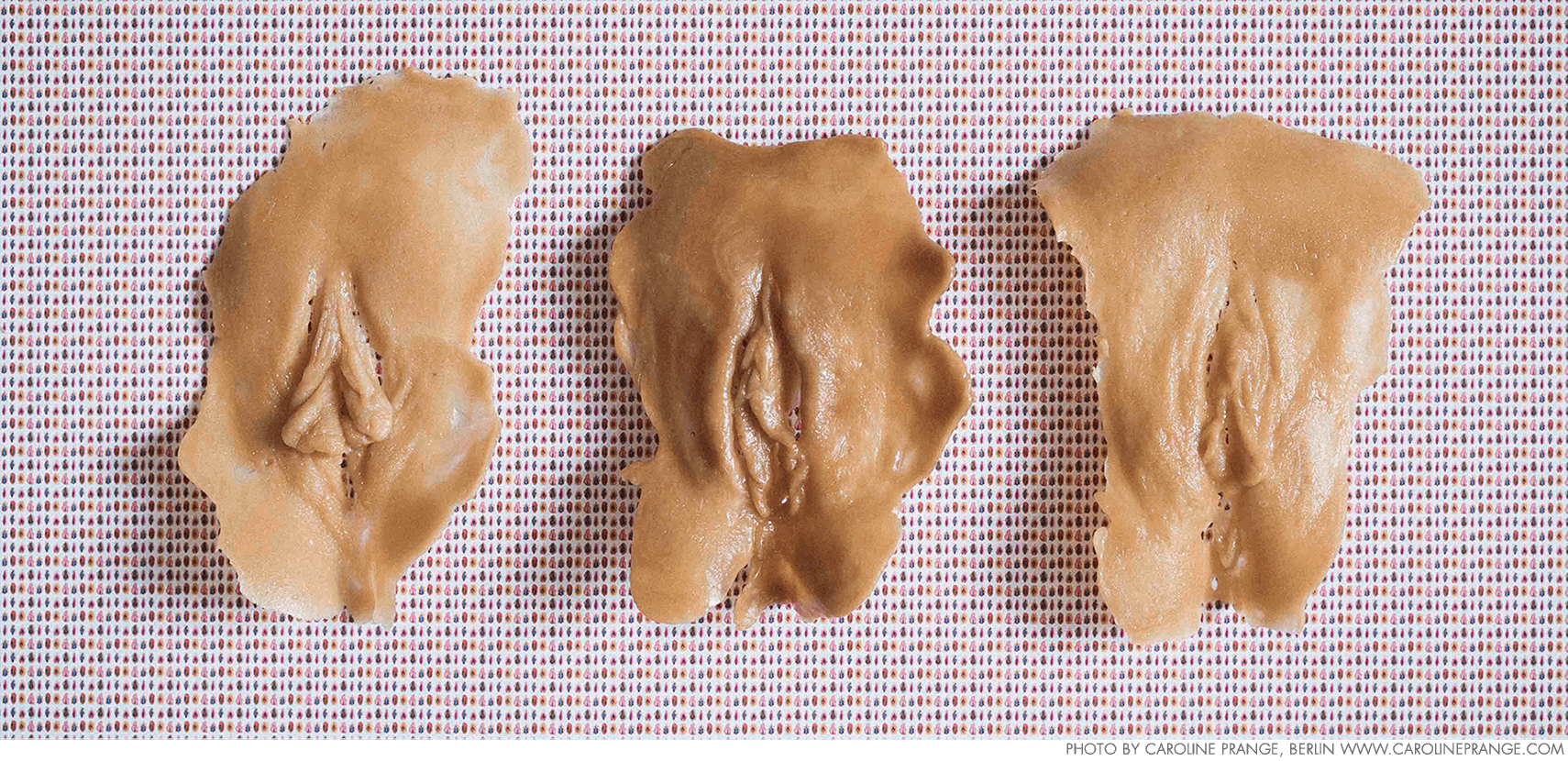Feel the V

We are what we eat. In fact, eating itself is a political act, and what we consume impacts our society. These considerations drive us to champion the consistent use of natural products from our region and inform our position against standardized foodstuffs. We reject mass production based exclusively on price, not origin, that floods local markets with bland tastes. We renounce a world of shelves filled with perfectly straight but savorless cucumbers, instead of their tastier but crooked relatives sourced from local farms.
We treat people much the same way. Don’t we all apply certain visual standards, spurning that which is not thin, smooth and flawless? Those who don’t make the cut naturally are encouraged to use a different kind of knife: a virtual one via photoshop or a real one in the hands of a plastic surgeon.
We support #feeltheV, a cooperative project between Ida Aniz and Ellebasi Gorengpeng from the artist collective Vulvae. It seeks to draw attention to these disingenuous norms and raise awareness of the damage they cause. Together we are planting our flag on behalf of natural bodies and natural ingredients.
Together with Vulvae, we’ve created a sweet, highly unusual delicacy for each guest to take home. It is a statement against both abstruse beauty ideals for our intimate zones and against standardized products and foodstuffs. We stand for a new, open view of the human body, and intentionally started with the vulva.
Why? Because discourse about naked (female*) reproductive organs remains, even today, strongly laden with shame. Images of the vulva are typically seen as offensive and are hidden from public view. The forum for realistic portrayals of the vulva has fallen almost exclusively to medicine or pornography. And because medical texts reach only a relatively small circle, the vulva is most frequently sighted solely in erotic or pornographic depictions. Yet even these images are subject to a quiet lie: they typically present only the “designer pussy,” with its non-protruding labia suggesting a clean and flawless appearance. This look is subtly promoted as the norm, with any deviations ‘repaired’ using photo editing software.
The fact that the majority of women* do not reflect this norm is, for all intents and purposes, irrelevant. To the contrary, artificial tools have been created to facilitate greater conformity. The growing number of vaginoplasties attest to the power that the images can have. Germany’s women* are no exception, with demand on the rise here for labial reductions and tightening of the vagina as well. By 2016, procedures related to the vulva had risen to one of the ten most frequent plastic surgery procedures in this country – and the trend continues to point upward.
Ida Aniz and Ellebasi Gorengpeng are questioning this media-driven “beauty ideal,” one reinforced by a culture of shame and silence. Some might see this as an odd approach, given that the internet and social media deliver a seemingly infinite volume of information and images. Yet exposure is not the same as enlightenment. And this goes beyond just the (lack of) knowledge about the appearance of the vulva. Many people are unaware of the difference between the vulva and vagina; nor are many words spent on other organs such as the clitoris and the uterus. By promoting greater knowledge, the pair of artists hope to expand consciousness and encourage positive body image. They view their art as a new visual language for bodies and sexuality, offering alternatives to the more prevalent but often censored images
As of May 2018, visitors will be able to evaluate the project for themselves, as we’ll be showcasing the artists’ work in our eatery’s front windows. The ceremonial opening will be held on 5 May 2018 in front of our establishment, starting at 2 pm.
Date: Saturday, 5 May 2018 from 2:00 to 5:00 pm
Ceremonial opening of the “Feel the V” exhibit (Link to Facebook Event)
Speiselokal Nobelhart & Schmutzig
Friedrichstraße 218
10969 Berlin – Kreuzberg
Tel. +49 30 259 4061 – 0
Feel the V

We are what we eat. In fact, eating itself is a political act, and what we consume impacts our society. These considerations drive us to champion the consistent use of natural products from our region and inform our position against standardized foodstuffs. We reject mass production based exclusively on price, not origin, that floods local markets with bland tastes. We renounce a world of shelves filled with perfectly straight but savorless cucumbers, instead of their tastier but crooked relatives sourced from local farms.
We treat people much the same way. Don’t we all apply certain visual standards, spurning that which is not thin, smooth and flawless? Those who don’t make the cut naturally are encouraged to use a different kind of knife: a virtual one via photoshop or a real one in the hands of a plastic surgeon.
We support #feeltheV,a cooperative project between Ida Aniz and Ellebasi Gorengpeng from the artist collective Vulvae. It seeks to draw attention to these disingenuous norms and raise awareness of the damage they cause. Together we are planting our flag on behalf of natural bodies and natural ingredients.
Together with Vulvae, we’ve created a sweet, highly unusual delicacy for each guest to take home. It is a statement against both abstruse beauty ideals for our intimate zones and against standardized products and foodstuffs. We stand for a new, open view of the human body, and intentionally started with the vulva.
Why? Because discourse about naked (female*) reproductive organs remains, even today, strongly laden with shame. Images of the vulva are typically seen as offensive and are hidden from public view. The forum for realistic portrayals of the vulva has fallen almost exclusively to medicine or pornography. And because medical texts reach only a relatively small circle, the vulva is most frequently sighted solely in erotic or pornographic depictions. Yet even these images are subject to a quiet lie: they typically present only the “designer pussy,” with its non-protruding labia suggesting a clean and flawless appearance. This look is subtly promoted as the norm, with any deviations ‘repaired’ using photo editing software.
The fact that the majority of women* do not reflect this norm is, for all intents and purposes, irrelevant. To the contrary, artificial tools have been created to facilitate greater conformity. The growing number of vaginoplasties attest to the power that the images can have. Germany’s women* are no exception, with demand on the rise here for labial reductions and tightening of the vagina as well. By 2016, procedures related to the vulva had risen to one of the ten most frequent plastic surgery procedures in this country – and the trend continues to point upward.
Ida Aniz and Ellebasi Gorengpeng are questioning this media-driven “beauty ideal,” one reinforced by a culture of shame and silence. Some might see this as an odd approach, given that the internet and social media deliver a seemingly infinite volume of information and images. Yet exposure is not the same as enlightenment. And this goes beyond just the (lack of) knowledge about the appearance of the vulva. Many people are unaware of the difference between the vulva and vagina; nor are many words spent on other organs such as the clitoris and the uterus. By promoting greater knowledge, the pair of artists hope to expand consciousness and encourage positive body image. They view their art as a new visual language for bodies and sexuality, offering alternatives to the more prevalent but often censored images
As of May 2018, visitors will be able to evaluate the project for themselves, as we’ll be showcasing the artists’ work in our eatery’s front windows. The ceremonial opening will be held on 5 May 2018 in front of our establishment, starting at 2 pm.
Date: Saturday, 5 May 2018 from 2:00 to 5:00 pm
Ceremonial opening of the “Feel the V” exhibit (Link to Facebook Event)
Speiselokal Nobelhart & Schmutzig
Friedrichstraße 218
10969 Berlin – Kreuzberg
Tel. +49 30 259 4061 – 0
